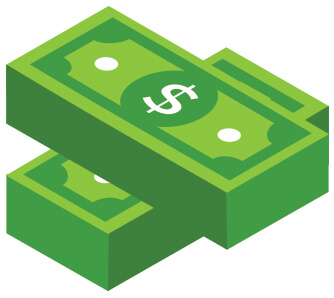SECTION 5: PHUKET PROPERTY VALUE BASED ON RENTAL INCOME
ALWAYS HIGH DEMAND FOR PHUKET RENTAL CONDOS AND VILLAS
Although the post-Covid era has changed the Phuket real estate landscape, with a huge increase in the amount of foreign resident’s moving to the island, there is still a large proportion of new buyers seeking investment opportunities.
The potential for long-term capital gains has historically driven most global property markets. While this is most certainly a reasonable expectation in Phuket, the market is also driven by investors, demanding a better return on their money by investing in Phuket property and, perhaps, even diversification over asset classes and currencies in their portfolios.
Returns in Phuket, taken as an average, equate to around 6-7% net per annum. We do see occasional good years beating this average, however, we also see years that underachieve.
If a property to is to ever achieve a much higher return, we have even known one to achieve a net return of 15% each year, it is likely to be a villa, as villa demand in the high season between November and April is through the roof, and it is rare for a villa not to be rented out over this entire period.
Both villa and condominium projects may be marketed as income producing, but condominiums, being more affordable, make up the bulk of individual sales in Phuket. Villas may make up less sales, but have a higher total monetary value of sales, due to their much higher price value.
There are also “condotels,” which enjoy both condominium and hotel licenses. They have professional management like other condos, but the extra hotel license allows the properties to be rented out on a short-term basis (i.e. for periods shorter than 30 days).
Sam Fauma and his colleagues at the International Law Office in Phuket have some advice on short-term and long-term rentals.
 What Sam Says About Short-Term vs. Long-Term Rentals
What Sam Says About Short-Term vs. Long-Term Rentals
The Hotel Act of Thailand (2004) clearly states that a hotel is “an accommodation established for business purposes of providing temporary accommodation service for travelers or any other person in exchange for compensation.” However, the Act specifically excludes from that definition “an accommodation established for the purpose of providing accommodation service for monthly paid service charge or upward only.”
In other words, any business providing temporary accommodation for a period shorter than 30 days is considered to be operating as a hotel, and falls under this act. Anyone owning a villa or a condo in Phuket may not realise it, but if they are renting through an agent or an internet service (e.g. booking.com or airbnb.com) they, too, may find themselves defined as a hotel, and thus be required to have a hotel license in order to offer short-term rental.
Thankfully, in 2008, there were Ministerial Regulations issued for an exemption from this Act, as follows: “Any dwelling place which has a number of rooms not more than four rooms, whether in a single building or in several buildings, and with a total service capacity of not more than 20 guests, operating as a business which provides an additional source of income for the owners.” So if you own a Phuket condo, or multiple condos, with no more than four bedrooms, sleeping no more than 20 people, you may apply to exempt your properties, and carry on with legal short-term rentals. As the owner of such premises, however, you are also required to report to the Hotel Registrar.
The popularity of Airbnb (especially) has highlighted the number of rentals which are technically illegal, but they do not have to be. It is surprising how few people make the effort to ensure that they are in compliance with Thai law when they rent their Phuket property.
Are the Guaranteed Returns on Investment (ROI) Really Guaranteed?
Clint Eastwood once said, “If you want a guarantee, buy a toaster.” So what would Dirty Harry make of the guarantees being offered by Phuket condominium developers? Are the returns really 100% guaranteed?
This question does not have a straightforward answer, and without trying to be funny, the best answer really is yes…and no.
First and foremost, the guaranteed return contract must be reviewed by a lawyer to ensure it represents the buyer’s interests. If it is poorly constructed, part of the return could be going to the developer for common area maintenance, while the buyer is left to pay for their own maintenance and management fees. Because these fees are typically absorbed by the developer, this underlines the importance of securing the right lawyer.
Once the wording of the contract is ensured, in our experience, short-term guarantees are realistic because developers usually budget for this expense. In most cases, it will already be built into the sales and marketing costs of each condo unit. In fact, some developers actually prepay the rental returns as a lump sum as soon as the final payment on the condo is received.
The viability of longer-term rental guarantees, however, will be down to the overall health of the tourism industry in Phuket. Any major contraction in tourist figures would almost certainly trigger a contraction of the local economy. A prolonged contraction would have a knock-on effect on Phuket’s property market, as guaranteed returns are based on filling available units with tourists every year.
The number of tourists visiting Phuket has been steadily increasing over the last twenty years. During this time there have been events which negatively impacted tourism (see Black Swans of Tourism in this guide), but after each falloff, the number of tourists continued to reach new highs.
But how bad were the bad years? There was the Asia Crisis, the bursting of the tech bubble, bird flu, SARS, the global financial crisis, military coups and a tsunami in the middle of peak season. These events had a marked effect on tourism at the time each occurred, but both Phuket bounced back with renewed vigour each time.
In terms of rental guarantees, the only thing likely to derail most ROI agreements (aside from poor management or bankruptcy) would be a ruinous contraction in the tourist economy. If a buyer is motivated by the promise of guaranteed rental returns on their Phuket condo purchase, they should have a lawyer carefully review any agreement drawn up by the developer or management company, especially if they are buying multiple condo units at a single development.
The necessary due diligence must find out as much as possible about the:
- credit worthiness of the developer
- track record of the management company
- terms of their own occupancy, and
- consequences should they decide to sell the unit during the guaranteed period (to make sure there are no penalties for doing so).
It is also worth asking what happens when the terms or promises made by the developer and/or management company are not met in full. If the conditions are not met, what other forms of compensation exist?
These checks may be moot if the development prepays the rental returns, which would negate any risks involved with the guaranteed rental return contract.

One of the latest marketing strategies by developers, especially on leasehold units, is to offer buyers a guaranteed buy-back program. This is effectively promising to buy back the condo unit or villa at full price, or even at a profit, after 5, 10 or 15 years. Here is our article on the subject:
What Is a Developer Guaranteed Buy-Back Option When You Buy a Phuket Condominium or Villa?
In Summary
Phuket’s immense appeal to holiday makers and long term residents keeps on growing, moving hand in hand with Phuket’s property market. The incredibly high demand for rental villas and condos in the high season is testament to this. Discerning buyers may look to capitalise on short term rental returns for holiday makers through an exemption. Or they may focus on the long term rental market, also in high demand from the huge influx of expatriates moving to the island over the last few years.
The information contained in the Phuket Property Guide and all related Thai Residential articles is provided for general informational purposes only and does not constitute legal or financial advice. Property laws and regulations in Thailand are subject to change. Readers should seek independent legal counsel or official confirmation from the relevant authorities before entering into any property transaction or investment.

Social Contact